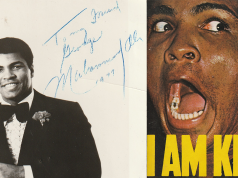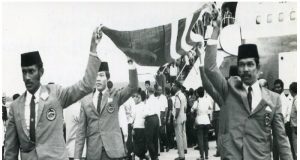
By
Hishamuddin Aun: I grew up idolising Mokhtar Dahari – which kid who loves playing football then wouldn’t – but unlike them, I must have been blessed to befriend Malaysia’s football legend that brought me close enough to writing his authorised biography. Alas, fate decided otherwise.
“Tar (as I used to call him then), I need a whole week with you in Fraser’s Hill where we can talk about football, from your early days, your formative years, your highs and lows with Selangor and the national team and every little thing that you would like to share in your book,” I told him one day.
His reply came without much thought: “Consider it done, just tell me the dates for me to take leave from work, but why Fraser’s?” It was simply because The New Straits Times Press (NSTP) has an old bungalow there where it is quiet and without many distractions where we could talk football, eat football and sleep football. How all these came about was much of a surprise to me, and beyond my wildest dreams. Writing a biography of Supermokh – as the media and fans were fond of calling him – would have indeed been a privilege and honour, regardless of the hard work and the tedious probing that was required to bring out the best stories from him. “Sham, can I see you before training starts tomorrow?” Mokhtar asked me after an afternoon training session when he was coach of Kwong Yik Bank in 1987. (He had announced his retirement at the end of the previous Malaysia Cup season when Selangor capped a fine performance in a 6-1 win over Johor in the final at the Merdeka Stadium. What ensued the following day was something I had not prepared myself for. There he was at the clubhouse with his prized possession – several scrapbooks of newspaper cuttings featuring him as early as his Burnley Cup days with Selangor in 1971. “Look at this clipping,” he said, drawing my attention to a tiny cutting from the widely circulated English football magazine “Shoot” that wrote “A guy named Hero Dahari scored the equaliser in a 1-1 draw with England B”. It was a small part of a column by the then England B striker, Gordon Hill, who went home from their Far East Tour much impressed with Malaysia’s prized footballer.
In the friendly match at a packed Merdeka Stadium on 30th May 1978, the visitors that boasted of among others Joe Corrigan, Viv Anderson, Alan Kennedy, Paul Mariner and Gordon Hill in their starting 11, led with Kennedy’s goal before Mokhtar’s glorious long range effort beat Corrigan in goal to tie the score. Of all the press clippings, Mokhtar told me that small piece, no more than four paragraphs in all, was the one he treasured the most and it meant the whole world to him.

Mokhtar had not only carefully selected, cut and pasted those newspaper cuttings himself onto the pages of the scrapbooks, but had also made jottings and footnotes to underline each and every write-up’s significance to him.
“Here, take these scrapbooks home with you. Just spend some time going through these cuttings and tell me your thoughts,” he continued. I can’t help noticing some of the more recent cuttings bore my byline which made me a little proud as well. “But why?” I asked ignorantly.
“I need your help to write a book for (about) me,” was his quick reply. “It is not about wanting to glorify myself but to share my story that could perhaps motivate our future generations,” he stressed. It never crossed my mind on what he meant by “help” or how much I was to be paid but I immediately replied in the affirmative, much to Mokhtar’s gratitude.
Months went by without much progress on the book project – discussions on whether a one-time lump sum payment or a royalty on every copy sold was agreeable came to an impasse-when I decided to seek answers on what I thought to be the salient and selling points of his story before proceeding any further.
Mokhtar, after all, had been known to be very selective with journalists, restricting access to only a few whom he was comfortable with over the years and even so, preferred to choose his words very carefully and almost always keeping it brief – and often letting his exploits on the field do the talking for him.
Even his demeanour could be confusing at times. There were occasions when he would greet me like a long lost friend with his personal warmth – often with a bear hug — and at other times gave me the cold shoulder as if I was a total stranger in his eyes.
And, mostly for no apparent reason too. You mustn’t think he had mood swings out of the blue but over the years, I had resigned myself to the fact that it was a part of Supermokh’s aura – he was similar to most of his teammates but distinctively different at the same time.
“Hah what do you want from me?” he would bark when approached after an energy-sapping hot afternoon training session or otherwise he would be making the first move: “I could sense that you’ve not been wanting to talk to me, why lah?”
Well, that was Mokhtar the enigmatic star of Malaysian football. Former New Straits Times sportswriter, the late Dan Guen Chin, a long time ghostwriter for Mokhtar for the latter’s weekly column – first with The Star and later with NST – could easily vouch for that.

I am forever indebted to Dan for it was he who introduced me to Mokhtar when I was still wet behind the ears as a football writer when the latter had been a household name and everyone’s hero for many years. “Tar, can you be open enough with me on two ‘six-million-dollar questions’,” I asked him one afternoon to which he nodded. But I had earlier explained that it was part of the story line of his biography that would be important to his endearing fans. “Number one,” I continued, “there has been a lot of talk of you drawing strength from supernatural means; and number two, and some fans have accused you of ‘kelong’ (the more popular term used when a footballer is thought to have fixed the result of a match for substantial monetary reward).”
Mokhtar frowned, stared at me in the face as if he was going to swallow me and then smiled. “I knew you were going to ask me that. But what surprised me is you too believed in all that,” he quipped.
“Well, I think it was about time I put everything on record so that such questions would not be posed to me ever again.” Bingo! Scrambling for my Sony micro-cassette tape recorder – a very important tool for reporters during such interviews then — my fingers must have trembled with excitement when Mokhtar began to speak rather cautiously. “It is not anything new for I have heard of this from a few close friends and relatives. The first time I heard about this, I laughed my heart out. How foolish and daft, I thought to myself.
“They were saying I used ‘susuk’ (the likes of a tiny golden needle to enhance one’s beauty or a steel needle where one is believed to draw strength from by way of inserting them into one’s face or limbs only to be performed by a shaman with so-called magical powers).
“Don’t they know I spent hours during and after training building on my muscle mass and what you see today is a result of years of hard work and toil. If ‘susuk’ can help me achieve this in a short space of time, then why would I bother pushing myself to the limit in every training session? And if at all this thing works, what’s stopping others, be they defenders or strikers like me, from doing the same and we could probably have a team of hunks playing in the World Cup already.
“Mind you, I have played for my state and country for more than a decade now. If at all I was using ‘susuk’, I would have had needles inside every inch of my legs today and that would surely cause me immense pain more than the so called strength that I should derive from,” he said.
“Pain” was something Mokhtar had become accustomed to with both his knees having to bear the brunt for all those hard running and endless pile-drivers that resulted in goals which brought a lot of joy to the spectators.
Mokhtar had had torn meniscus removed from both his knees through separate surgeries – the first in December 1976 — to enable him to continue his playing career, otherwise he would have to quit the game much sooner than he wanted to.
In fact, in spite of having announced his retirement at the age of 33 (born November 13,1953) after captaining Selangor to Malaysia Cup glory for the last time in the 1986 final, Mokhtar was coaxed to come back the following year to which he duly obliged only for Selangor to exit at the quarter-final stage. “Every day when I got home, there would be two huge basins full of hot water with coarse salt added for me to dip both my knees in, just to ease the pain and discomfort as a consequence of hard training and running.
“Of course the fans do not know this. And how I wished ‘susuk’ could take care of this if what they were saying was true! Furthermore, I have always believed there is no short cut to real hard training, so much so all these talk about me using ‘susuk’ is totally untrue. As a staunch Muslim, it is something that Allah forbade me,” he remarked, “or else something bad would befall me.” With that issue addressed, now come the real crunch. “Sham, tell me have you ever suspected me of selling matches or has any official implied that I had been on the take?” Mokhtar became the aggressor. I did the obvious and just shook my head.
“Yes, I did it once,” he blurted out. “It was a game (against Singapore) that Selangor was not expected to win,” he explained. “I was induced with a $2,000-a-goal payoff and I scored a brace,” he said with a smile. “I swear that was the only time as I did not want to put too much pressure on myself and I would be greedy as goals are a result of team effort, not individual. Even that payoff came from a ‘big fan’, not from a bookie.”
Mokhtar understood very well that that was not the line of questioning that I had in mind when he continued: “But to take money to lose a game… never. All my life, I have only played to win.
“Furthermore, which bookie would want to waste their money on a striker,” he jested. “A striker does not determine the result of a match, perhaps he only spoils it.” That argument was however proven more of a myth than a fact as the infamous nationwide crackdown on football bribery in 1994 and 1995 as a result of a ‘Cabinet paper’ to rid the game of match-fixing, showed there were several strikers involved.
While talking on the same topic, it must have echoed in Mokhtar’s ears of the abusive shouts of “Mokhtar kelong… Mokhtar kelong” when he had gone through a bad patch and his goals begun to be few and far between.
This had led to his abrupt decision to quit the Selangor team at one point. Mokhtar, however, refused to be drawn into saying whether or not any of his teammates were involved while adding it was the job of the team officials to find out and cleanse the team of such bad elements. “I may have my suspicions but I really don’t know because these things were not done openly. Of course I know if a teammate is playing well below his usual capability but how am I to say that this player or that player has taken a bribe.
“Similarly, the fans have been shouting ‘Mokhtar kelong’ – and I can tell you that really hurt – despite my conscience reminding me I have not. They paid 10 ringgit to watch you play, so I guess they had every right to express their displeasure. But if there is one thing that I wished the spectators would understand, it is not easy for a striker to keep scoring goals week in week out.
“In the midst of a sea of legs in the opponent’s box, and the space between the goalkeeper and his goal posts, the only room a striker has to place his shot to attempt a goal in that split second is no bigger than a toilet door,” he said.
Where Mokhtar was reluctant to divulge much on the bribery menace, his wife, Tengku Zarina Ibrahim, offered slightly more to it. “I remember one time he picked me up from work and he mentioned that he has resigned from the national team. And I asked him when? And he said this morning.
“I looked at him and asked why. He said football is no longer a clean game,” she said in a documentary The Untold Truth About Supermokh on the National Geographic Channel on 30th August 2010.
“I wanted to probe, I mean I wanted to discuss further but he said let’s drop the subject. I know that resigning from the national team was very painful for him,” she added. With that brief interview done, I knew at that point of time that I had a clear view of what direction the biography should take, with Mokhtar’s immense contribution in helping Selangor win the Malaysia Cup 10 times in 14 years and his exploits with the national team, including winning the bronze medal at the Tehran Asian Games in 1974 being his highest achievement, forming the basis of his story. However, the biography project remained a dream when Mokhtar had other priorities then as rumours abounded in late 1988 that he was suffering from a rare illness and eventually confirmed as motor neuron disease that led to his untimely and premature demise on July 11 1991. To Mokhtar, I owe a week-long interview in the cool hills that never took place and a biography that had not even gone to its very first page. But, the memories of Supermokh certainly live on.



 If you have an interesting personal story of a sports personality with photographs and video, we would like to publish it on this site.
If you have an interesting personal story of a sports personality with photographs and video, we would like to publish it on this site.


